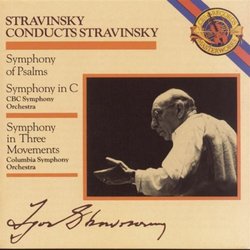| All Artists: Igor Stravinsky, Columbia Symphony Orchestra, CBC Symphony Orchestra Title: Stravinsky Conducts Stravinsky: Symphony of Psalms/Symphony in 3 Movements Members Wishing: 0 Total Copies: 1 Label: CBS Release Date: 10/25/1990 Genre: Classical Styles: Forms & Genres, Theatrical, Incidental & Program Music, Historical Periods, Modern, 20th, & 21st Century, Symphonies Number of Discs: 1 SwapaCD Credits: 1 UPC: 074644243420 |
Search - Igor Stravinsky, Columbia Symphony Orchestra, CBC Symphony Orchestra :: Stravinsky Conducts Stravinsky: Symphony of Psalms/Symphony in 3 Movements
 | Igor Stravinsky, Columbia Symphony Orchestra, CBC Symphony Orchestra Stravinsky Conducts Stravinsky: Symphony of Psalms/Symphony in 3 Movements Genre: Classical
Stravinsky was seldom the best conductor of his own music, but this disc of his three symphonies is an exception. In the first place, none of them are all that difficult to conduct--at least compared to some of his earlier... more » ![header=[] body=[This CD is available to be requested as disc only.]](/images/attributes/disc.png?v=a4e11020) ![header=[] body=[This CD is available to be requested with the disc and back insert.]](/images/attributes/disc_back.png?v=a4e11020) ![header=[] body=[This CD is available to be requested with the disc and front insert.]](/images/attributes/disc_front.png?v=a4e11020) ![header=[] body=[This CD is available to be requested with the disc, front and back inserts.]](/images/attributes/disc_front_back.png?v=a4e11020) |
Larger Image |
CD DetailsSynopsis
Amazon.com essential recording Stravinsky was seldom the best conductor of his own music, but this disc of his three symphonies is an exception. In the first place, none of them are all that difficult to conduct--at least compared to some of his earlier works--and he seems to have been in particularly good form throughout these recording sessions. He gets a particularly enthusiastic response from his Canadian forces in the Symphony of Psalms--one of this century's great choral masterworks, and seems to really enjoy the neo-classical elegance of the Symphony in C. Of all of the individual releases from Sony's complete Stravinsky edition, this one has pride of place. --David Hurwitz Similarly Requested CDs
|
CD ReviewsConductor-Proof Stravinsky: The Best of the Best TUCO H. | Los Angeles, CA | 10/09/2000 (5 out of 5 stars) "Stravinsky's version of "Symphony of Psalms" is MUCH, MUCH better than the Bernstein version picked over it in the Penguin Classical guide. It's odd that Stravinsky himself liked Bernstein's interpretation of his famous piece, considering his openly stated horror of 'interpretations' (such as Karajan's and Stokowoski's) and his life-long quest to write conductor-proof music, because his own version couldn't be more different; it has all the rough edges, rhythmic vitality, sense of danger, and precisely controlled tempos that Bernstein's lacks. Bernstein's version is for sleepwalkers only.In fact, "The Firebird" is the only piece Stravinsky conducted himself which I've heard conducted better by others (Dorati's version picked over it in the Penguin Guide is one of them). Stravinsky's own Symphony in C is peerless, so is the Rite-of-Spring-like Symphony in 3 movements. After I'm done listening to and being disappointed by everything else and want something that really digs deep and 'balances my soul,' as it were, I always come back to good old Stravinsky; and man, am I glad he's there!" Best Stravinsky Juan Keledjian | MIAMI, FL USA | 03/16/2000 (5 out of 5 stars) "I can't agree with that opinion about Stravinsky's bad conduction. I've heard most of the few versions available of his Symphony of Salms, and when I got this one, I had to trash the others. The deep and profound double fugue is astonishing; the phrasing of the melody puts other versions to shame. It's both spiritual and scaring, and the sound competes with modern versions. I would also recommend Stravinsky's version of his Rite of Spring, on the same series, the only version you can really hear the true primitive and percussive character of this piece. The opportunity of listening masterpieces like these conducted by the composer and still having an excellent interpretation and sound quality is one in a lifetime. Don't miss this one." History more important than the Sound. Warlen Bassham | Bothell, WA United States | 01/12/2001 (4 out of 5 stars) "OK, so this recording was made a long time ago, and it shows.Never mind! You will never hear grander performances of these three works. Who better to interpret Stravinsky's music than the composer himself?The two orchestral symphonies are wonderful, but the prize on this recording is the Symphony of Psalms. The first time I ever heard the piece was at a San Francisco Symphony concert with Stravinsky conducting-- an electrifying experience. This recording, though it's of a different performance, captures that moment perfectly. I can close my eyes and see Stravinsky's tight, coiled beat-- can watch the concertmaster's eyes as he was transfixed by the composer's every move-- can see the awe-struck chorus members as they nervously blended with the orchestra.And I can relive that moment when the sound died finally away and the audience leaped as one person to its feet.If music can change people (and it can), then this music will change people forever."
|

 Track Listings (10) - Disc #1
Track Listings (10) - Disc #1








